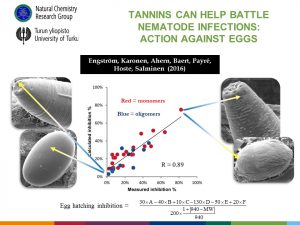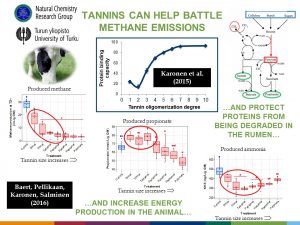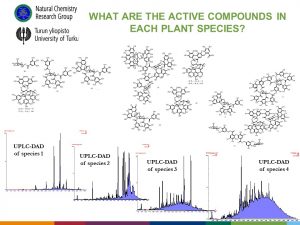OptiFeed (“Tannin diversity vs. reactivity: optimizing positive impacts of ruminant feed components”, Academy of Finland project no 298177) is the latest Academy project of the Natural Chemistry Research Group. It aims to dig deep with the enigma of what type of a tannin diversity is needed to optimise both tannin bioactivity and stability at the same time.

33 pure hydrolysable tannins was used in anthelmintic studies to show a clear structure-activity relationship. The size of the tannin was not the factor determining the activity, but more detailed inspection of the structures was needed to reveal an equation for the estimation of the anthelmintic activity directly from the tannin structure.

Our studies with a novel series of monomeric, dimeric, trimeric, tetrameric, pentameric, hexameric, heptameric and polymeric ellagitannin have shown that certain sizes of ellagitannins can decrease methane production in vitro, increase propionate levels in comparison to control, and protect feed proteins from being degraded in the rumen of ruminants.
Tannins are the secondary metabolites that are increasingly considered responsible for many positive effects related to ruminant nutrition and health: (1) they function as natural anthelmintics against gastrointestinal nematodes of ruminants thus enabling us to consider reducing the use of synthetic drugs for this purpose, (2) they may decrease the massive environmental emissions of ruminants even by tens of kg of methane and ammonia per dairy cow in a year, and (3) they may improve the inefficient use of proteins by ruminants thus making tannins an attractive alternative to be optimised for production in crops or to be added in feeds as an additive.
During the previous projects funded by the Academy of Finland (ET-ruminants) and European Union (LegumePlus) we have acquired good knowledge of the basis of tannin in vitro bioactivity for ruminants by utilizing more than 30 pure ellagitannins as model compounds. With OptiFeed we have the possibility to use this unique structure-activity data and to widen it to deal with all most common types of tannins found in the plant kingdom. Moreover, by utilizing latest advances in equipment and methods related to tannin chemistry, we can do competetive binding experiments with tens of chemically well-characterized model tannins, different types of proteins, different species of nematodes and even methanogenic bacteria. All this would be impossible without high-quality collaborative links to France, Denmark, Netherlands and LuKe in Finland.

Plants differ hugely in their tannin composition and content. Some species contain a simple mixture of simple structures, while others may contain a complex mixture of simple or complex structures. At the moment very little is known how the presence of one type of tannins affects the ruminant-related bioactivities of other types of tannins.
In addition to finding such tannin mixtures that hopefully maximise the overall bioactivity of a plant sample (and not only the activity in rumen, abomasum or small intestine), OptiFeed will do the first thorough sets of studies with model tannins to reveal the factors that govern tannin stability in conditions relevant to ruminant nutrition and health. This is crucial to understand if the tannins with e.g. good in vitro bioactivity against small intestine nematodes might remain active also in vivo during the passage from the rumen via abomasum to small intestine. We know that many tannin types are modified during this chemically harsh journey and that the metabolites formed are often very complex. At the moment very little is known of the metabolites formed from specific tannin structures and this represents a major challenge for the development and use of new tannin chemistry techniques.
This project is funded by the Academy of Finland (2016-2020) and lead by prof. Juha-Pekka Salminen. The project has one post doc (Dr. Marica Engström), one project researcher (MSc Anne Koivuniemi) and gives scientific support to four PhD students (Milla Leppä, Sanjib Saha, Iqbal Bin Imran, Juuso Laitila) and several undergraduates (Saara Nenonen, Janne Koskenoja, Eerik Piirtola, Joona Arvola, Valtteri Virtanen, Alexei Filin).
